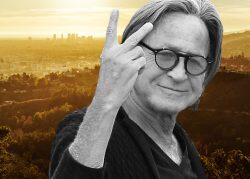Mohamed Hadid must pay $3 million in damages, a fraction of what plaintiffs were seeking, over the developer’s notorious Strada Vecchia project, a Los Angeles County jury determined.
The verdict came Friday after a highly anticipated trial that stretched on for weeks. The four plaintiffs had been seeking a total of $26 million in damages.
The case against Hadid, a recently embattled luxury builder who has often pursued outlandish projects, represented a larger test of the public’s tolerance of extravagant spec development in Bel Air, long among the Los Angeles area’s toniest neighborhoods. It was also a battle of personalities, with Plaintiff Joseph Horacek — dubbed by one magazine as “probably the WASPiest Hollywood entertainment lawyer alive” — serving as a genteel foil to the brazenness of Hadid, a mogul who was born in Palestine but has fully embraced American celebrity.
“We are very disappointed,’’ said Judith Bedrosian, one of the plaintiffs. “We would like to sell our homes. Who’s going to buy our house with that thing up there?’’
Hadid did not return multiple requests for comment left in recent days.
The civil trial began in early August, but the larger saga over the property at 901 Strada Vecchia Road in Bel Air has been brewing for years.
Hadid bought the property for $2 million in 2011. In 2014, after he had begun construction of the roughy 30,000-square-foot project, the City of Los Angeles Building Department issued a stop-work order, asserting that the mansion-in-progress was bigger than allowed, and that elements of its plan, including decks and an IMAX theater, had never been approved.
Critics of the extravagant mansion dubbed it “Starship Enterprise,” because of the curved building’s resemblance to a futuristic spaceship. “If anything, it looks more like a chic grain silo,” The Real Deal wrote last year.
But Hadid ignored the mandate, leading to criminal charges; in 2017 the developer pleaded no contest to those charges and was sentenced to probation and 200 hours of community service, although neighbors subsequently questioned whether the celebrity developer actually completed the mandate or simply bought cooperation from a local church, the Los Angeles Times reported in 2019.
“When I went in and pled no contest, it’s because I just didn’t want anybody to get hurt,” he told The Real Deal last year. “It’s all small guys I work with.”
Read more

The civil case was filed in June 2018 by Horacek, his wife Beatriz, and John and Judith Bedrosian. Both couples live directly below the property, and argued the Strada Vecchia project had turned their lives into a nightmare and presented a kind of existential danger to their homes: The construction caused landslides and mudslides, they alleged, and the structure could even potentially slide down the hill in an earthquake. In filing the suit, the neighbors alleged the city was essentially failing to enforce its own codes by allowing the dangerous building to stand.
“After seven years of this painful saga, this community is fed up,” Victor de la Cruz, an attorney for the plaintiffs, said in a statement at the time. “Mohamed Hadid has made a mockery of the city’s laws and the safety of his neighbors, and astonishingly the City of Los Angeles has turned a blind eye.” The only way to bring the mansion into compliance, de la Cruz added, was to tear it down.
A court agreed. In November 2019, as part of the civil case, Los Angeles County Superior Court Judge Craig Karlan ordered the partially-built mansion demolished.
“It’s not even a close call in my mind that the plaintiffs are at a legitimate risk of suffering damages and harm to their homes,” Karlan ruled. “It cannot remain, knowing what we know now.”
Karlan then appointed a court receiver to sell the property, who listed it for $8.5 million in January, with proceeds from any sale expected to go toward demolishing the partially-built structure. Earlier this year developer Bruce Lifton went into contract to buy the property, but the deal later fell through. No other buyer has come forward.
Throughout the civil trial, Hadid and his lawyers maintained that he had done nothing wrong. Hadid also presented himself as the victim of a “shakedown,” the New York Daily News reported: The jury heard audio, secretly recorded by Hadid, of a meeting between the developer and Horacek, during which the two parties spoke of a possible deal and Horacek suggested he could drop the claim.
“I think we can work something out,” Hadid said in the recording. “We’ll figure out a number.” Hadid mentioned $2 million in that conversation, and Horacek suggested $3 million.
Earlier this week, in a final pitch to jurors, Ariel Neuman, a lawyer for the plaintiffs, argued that the developer had been motivated by greed. “The danger here is real,” Neuman said, according to the Daily News, and added that his clients had been “living in fear” instead of enjoying their golden years.
“Our experts testified that he made the hillside safer than when he bought it,” countered Jeffrey Reeves, Hadid’s lead lawyer.
The verdict comes as Hadid is also facing other high-profile development controversies. For years he’s fought conservation advocates over the fate of an undeveloped, roughly 70-acre plot of land near Franklin Canyon Park that intersects with a popular hiking trail.
The developer defaulted on more than $25 million in loans on that property, and a bankruptcy auction is scheduled for October. Hadid has started construction on another highly ambitious, hilltop mega mansion, adjacent to the Franklin Canyon plot, but that project faces a litany of lawsuits and mechanic’s liens. Last month Hadid listed the unbuilt spec project, located at 9650 Cedarbrook Drive, for an eye-popping $250 million.
